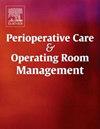Operationalising the right to refuse treatment: karnataka’s 2025 response to the 2023 Order
IF 1
Q2 Nursing
Perioperative Care and Operating Room Management
Pub Date : 2025-09-22
DOI:10.1016/j.pcorm.2025.100557
引用次数: 0
Abstract
Background
Indian law recognises refusal of life-sustaining treatment and accepts advance directives. The order of 24 January 2023 sets attestation before a notary or a Gazetted Officer, allows authenticity checks through digital health records or named public custodians, and assigns activation to Primary and Secondary Medical Boards. This study asks whether Karnataka’s 2025 measures supply the required custody route and how hospitals can record cross-district verification within existing law.
Methods
Doctrinal analysis of national rules and Karnataka’s 2025 instruments; review of professional guidance on end-of-life decisions and Do-Not-Attempt-Resuscitation (DNAR); and use of migration data to frame document reach. From these sources, a concise verification workflow and audit checks were derived.
Findings
Karnataka names the Joint Commissioner in each Bruhat Bengaluru Mahanagara Palike zone and the Executive Officer of each taluk panchayat as custodians, and standardises Secondary Medical Boards from existing practitioner pools, with judicial acknowledgment of compliance. A three-channel method suits high mobility: consented access to a personal health record, contact with persons named in the directive, and written confirmation from the identified custodian. The file then carries an authenticity note recording version, attestation, source, and times, plus time-stamped minutes from both Boards. Treating authenticity as reach and version control improves reliability across districts and yields clear audit points, including time to first verified copy and concordance across versions.
Conclusions
Karnataka’s measures answer the custody question in the affirmative and allow verification within the national scheme. With attested directives, named contacts, reachable custodians, DNAR where relevant, and brief reasoned minutes, hospitals can produce a reviewable record that supports timely decisions while respecting autonomy and privacy.
实施拒绝治疗的权利:卡纳塔克邦2025年对2023年法令的回应
印度法律承认拒绝维持生命的治疗,并接受预先指示。2023年1月24日的命令将证明交给公证人或宪报官员,允许通过数字健康记录或指定的公共保管人进行真实性检查,并指定初级和二级医疗委员会启动。本研究询问卡纳塔克邦2025年的措施是否提供了所需的监护路线,以及医院如何在现有法律范围内记录跨地区核实。方法对国家规定和卡纳塔克邦2025文件进行理论分析;审查关于临终决定和不尝试复苏(DNAR)的专业指导;并利用迁移数据来框定文档到达。从这些来源,得出了一个简明的验证工作流程和审计检查。《卡纳塔克邦调查报告》任命布鲁哈特·班加罗尔Mahanagara paralike区的联合专员和每个塔鲁克村务委员会的行政官员为监管人,并从现有的执业人员中对二级医疗委员会进行标准化,并司法确认其遵守情况。三渠道方法适合高流动性:经同意查阅个人健康记录,与指令中指定的人员联系,以及获得已确定的监护人的书面确认。然后,该文件带有记录版本,证明,来源和时间的真实性说明,以及两个董事会的时间戳分钟。将真实性视为范围和版本控制,可以提高跨区域的可靠性,并产生明确的审计点,包括首次验证副本的时间和跨版本的一致性。结论卡纳塔克邦的措施肯定地回答了监护问题,并允许在国家计划内进行核查。有了经过认证的指令、指定的联系人、可联系的监护人、相关的DNAR和简短的推理分钟,医院可以生成可审查的记录,在尊重自主权和隐私的同时支持及时决策。
本文章由计算机程序翻译,如有差异,请以英文原文为准。
求助全文
约1分钟内获得全文
求助全文
来源期刊

Perioperative Care and Operating Room Management
Nursing-Medical and Surgical Nursing
CiteScore
1.30
自引率
0.00%
发文量
52
审稿时长
56 days
期刊介绍:
The objective of this new online journal is to serve as a multidisciplinary, peer-reviewed source of information related to the administrative, economic, operational, safety, and quality aspects of the ambulatory and in-patient operating room and interventional procedural processes. The journal will provide high-quality information and research findings on operational and system-based approaches to ensure safe, coordinated, and high-value periprocedural care. With the current focus on value in health care it is essential that there is a venue for researchers to publish articles on quality improvement process initiatives, process flow modeling, information management, efficient design, cost improvement, use of novel technologies, and management.
 求助内容:
求助内容: 应助结果提醒方式:
应助结果提醒方式:


